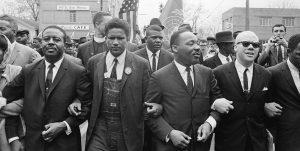
Dr. Martin Luther King, Jr.
Watching the protests on the news carried me back in time to my protest days in the 70s and the inspiration I gained from Martin Luther King. His teaching, “Darkness cannot drive out darkness; only light can do that. Hate cannot drive out hate; only love can do that” is so relevant for these heartbreaking times.
In times of extreme stress, we feel lost and do not know what to do. Although counter-intuitive, when under such pressure is when we need to practice compassion for self and others. Breathing sustains life, but we feel threatened by a killer virus lurking in the air, and the fear of suffocation by those tasked with protecting us. Take a deep breath.
Now is the time to care for self and others. Doing so, we will not fall victim to the anger and violence that hatred spews.
Now is the time to remember we are all human beings doing the best we can, and that includes you and me. As Nelson Mandela so beautifully explained, “No one is born hating another.” In the memory of George Floyd, we cannot allow hatred and fear to drive our actions. We cannot allow ourselves to be reduced to the kind of cruel behavior that killed him. Instead, we can practice opening open our hearts by welcoming others without labeling or judging.
Oddly enough, it is not a matter of looking for goodness. Goodness can be a judgment that drives our anxiety up when we don’t find it. An alternative is to focus on the question, “what will do no harm?” In stressful situations, that is not an easy task. Yet, as horrific as the killing of George Floyd is, we can honor his life by taking up the challenge to generate solutions instead of more anxiety and fear. We need to look for ways to help, not harm. The problem is that solutions are found by working with those we label as different from us.
As a young war protestor in the early ’70s serving in student government, I got to know many in law enforcement who were truly good people. Several student groups backed by national organizations organized a large rally at our university. I was surprised to learn that many campus security officers feared the potential for violence, as were many of the students. As a student government representative, I helped campus security negotiate a deal with local and state police. If the protestors stayed on campus property and marched on only half of the public street next to the campus, the police would let the event proceed. After negotiating with protest organizers, the march was allowed to continue.
The time was the 70’s, the place was the South, and I was a short white woman 20 years of age. That meant I was just a girl. Yet, I was the one who organized some young men in student government and a few in the criminal justice department who had plans to go into law enforcement. We spaced ourselves out and walked down the centerline of the street as the marching occurred. We yelled at, pleaded with, and pulled on protestors to keep them on the ‘campus’ side. When police officers saw something that caused them to want to approach the protestors, we held up our hands with a firm, “Wait!” and then handled the matter for them. Despite being surrounded by hundreds of people, I remember the march as a lonely one. I and the few men I had gathered to help, walked alone. We walked in an open expanse of the street between protestors who held signs and shouted words of anger on one side and police officers lined up with batons in hand, guns on hips, and hints of fear in their eyes.
As the march ended, dusk had arrived, and student protestors were walking back to their quarters to celebrate getting their speeches in the press. The police began strolling back to cars and vans. Having thanked my crew of march organizers, I turned to walk back to the dorm. Suddenly I found myself surrounded by the head of campus security and several local police officers. Looking up into the faces of these tall and big men, the campus security officer said to me, “Miss, these men would like to speak with you.” All I could think was, “Oh no. What now?” One of the officers stepped out in front of the others, took his cap off, and put in under his arm. As he stated in a firm voice, “Thank you.” the other officers began nodding their heads at me as well. I was truly touched.
After telling them I was glad I could help, I added a comment about how together we had made sure no one was hurt. Everyone broke into big smiles. During that brief moment, no one was a girl, no one was a cop, and no one was campus security. Instead, we all were grateful human beings happy that we had done no harm.
We all can contribute to peace by not adding to the anger and hatred. Each of us can take responsibility for sharing compassion, and being responsible means being able to respond. We can use a few moments to play with a grandchild, send loving-kindness to all involved in a problematic situation, share a card or take a break from the news to enjoy the sunshine on our face. We all can respond with an open heart. We can reduce our anxiety by shifting our focus to doing no harm. Then might even enjoy a moment by engaging in a random act of kindness on an unsuspecting stranger.
